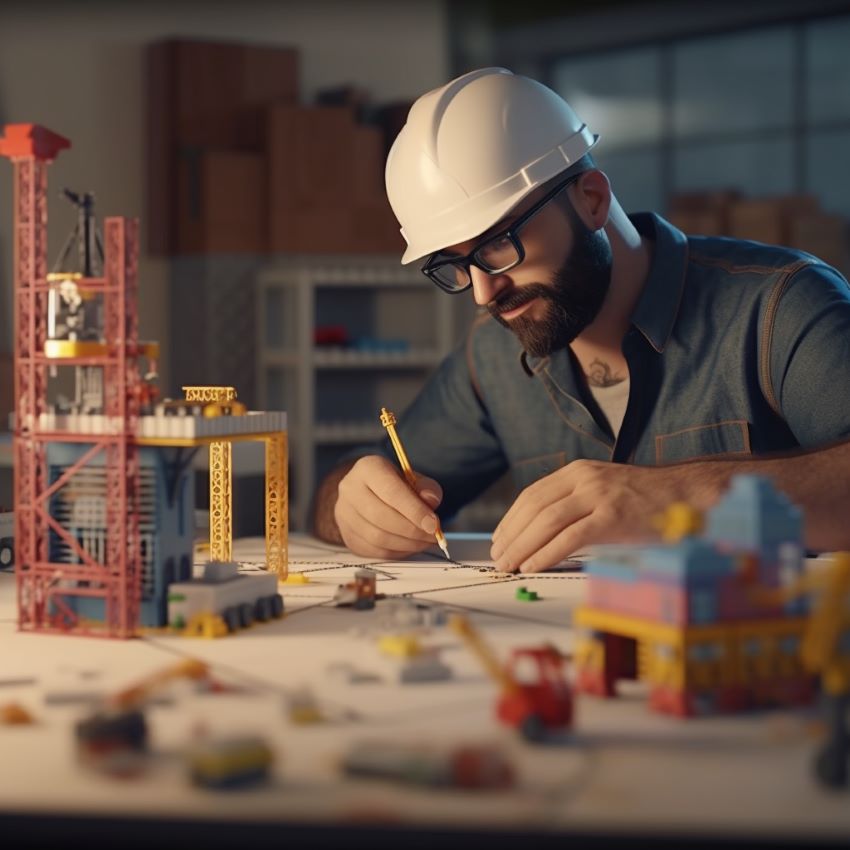Discover types of careers in construction industry, from project managers to carpenters. Explore responsibilities, skills, and career paths in the construction industry.

Welcome to the dynamic and ever-evolving world of construction jobs. From the grandeur of towering skyscrapers to the intricate craftsmanship of residential homes, the construction industry plays a vital role in shaping our built environment. In this article, we will delve into the diverse range of construction jobs and explore the key roles that contribute to successful construction projects.
Whether you aspire to be a construction project manager overseeing multimillion-dollar ventures, a skilled carpenter bringing architectural designs to life, or an innovative architect shaping the future of urban landscapes, there is a fulfilling career path waiting for you in construction. Join us as we explore the responsibilities, required skills, and the immense value these construction jobs provide to the industry and society at large.
Construction Jobs for Management
Construction Project Manager
As a construction project manager, your key result area is to oversee and manage construction projects from inception to completion. Responsibilities include planning, budgeting, scheduling, and coordinating various aspects of the project.
Skills required include strong leadership abilities, project management expertise, and excellent communication skills.
A bachelor’s degree in construction management or a related field is often preferred. Project management software, scheduling tools, and cost estimating software are commonly used in this role.
Construction Superintendent:
In this role, your primary responsibility is to supervise and coordinate construction activities on-site. Key result areas include managing construction crews, ensuring adherence to safety regulations, and monitoring progress.
Skills required include knowledge of construction methods, problem-solving abilities, and strong organizational skills. Education requirements vary, but relevant experience in construction is typically necessary. Construction superintendents often use mobile applications for communication, project management software, and scheduling tools.
Construction Jobs in Architecture and Design
Architect
As an architect, your key result area is to design and plan the construction or renovation of buildings. Responsibilities include creating architectural drawings, collaborating with clients and contractors, and ensuring compliance with building codes and regulations.
Skills required include creativity, technical expertise in architectural design, and knowledge of construction materials. A bachelor’s or master’s degree in architecture is typically required. Architects often use computer-aided design (CAD) software, building information modeling (BIM) tools, and drafting equipment.

Interior Designer
In this role, your main responsibility is to design and enhance interior spaces for functionality and aesthetics. Key result areas include creating design concepts, selecting materials and furnishings, and collaborating with clients and contractors.
Skills required include creativity, knowledge of design principles, and strong communication skills. A bachelor’s degree in interior design or a related field is often preferred. Interior designers use design software, drafting tools, and visualization tools to bring their concepts to life.
Construction Trades
Carpenter
As a carpenter, your key result area is to construct, install, and repair structures and fixtures made of wood. Responsibilities include reading blueprints, measuring and cutting materials, and assembling components.
Skills required include proficiency in carpentry techniques, mathematical skills, and the ability to use hand and power tools. Education requirements vary, but vocational training or apprenticeships are common. Carpenters use a wide range of hand tools, power tools, and measuring equipment.
Electrician
In this role, your primary responsibility is to install, maintain, and repair electrical systems in buildings. Key result areas include interpreting electrical blueprints, wiring and connecting electrical components, and troubleshooting electrical issues.
Skills required include knowledge of electrical codes and regulations, problem-solving abilities, and manual dexterity. Completion of an electrician apprenticeship program or vocational training is typically required. Electricians work with a variety of tools, such as wire strippers, multimeters, and power drills.
Mason
As a mason, your key result area is to build and repair structures using bricks, stones, or concrete blocks. Responsibilities include preparing surfaces, mixing mortar, and laying masonry units. Skills required include knowledge of masonry techniques, physical stamina, and the ability to work with precision. Education requirements vary, but vocational training or apprenticeships are common. Masons use tools such as trowels, levels, and masonry saws.
Construction Support Jobs
Construction Estimator
As a construction estimator, your key result area is to analyze project specifications and calculate the costs of materials, labor, and equipment. Responsibilities include reviewing blueprints, conducting takeoffs, and preparing cost estimates.
Skills required include strong analytical skills, knowledge of construction materials and methods, and proficiency in estimating software. Education requirements vary, but a degree or certification in construction management or a related field is beneficial. Construction estimators rely on estimating software, spreadsheet programs, and digital takeoff tools.
Construction Safety Officer
In this role, your primary responsibility is to ensure compliance with safety regulations and promote a safe working environment on construction sites. Key result areas include conducting safety inspections, providing safety training, and developing safety procedures.
Skills required include knowledge of construction safety standards, attention to detail, and effective communication skills. Education requirements vary, but certifications in occupational health and safety are beneficial. Construction safety officers may use safety inspection checklists, incident reporting software, and safety training materials.
Construction Engineering
Civil Engineer
As a civil engineer, your key result area is to plan, design, and oversee construction projects related to infrastructure, such as roads, bridges, and water supply systems. Responsibilities include analyzing project requirements, conducting feasibility studies, and ensuring compliance with regulations.
Skills required include strong technical knowledge, problem-solving abilities, and proficiency in engineering software. A bachelor’s degree in civil engineering is typically required. Civil engineers use design software, computer-aided design & engineering (CAD) tools, and project management software.

Structural Engineer
In this role, your main responsibility is to design and analyze the structural integrity of buildings and infrastructure. Key result areas include developing structural plans, conducting load calculations, and ensuring compliance with building codes.
Skills required include knowledge of structural analysis and design, attention to detail, and proficiency in structural engineering software. A bachelor’s degree in civil or structural engineering is typically required. Structural engineers use structural analysis software, CAD software, and building information modeling (BIM) tools.
Construction Administration
Construction Contracts Administrator
As a construction contracts administrator, your key result area is to manage contracts and legal documentation related to construction projects. Responsibilities include reviewing and drafting contracts, tracking project milestones, and resolving contract disputes.
Skills required include knowledge of contract law, attention to detail, and strong organizational skills. A bachelor’s degree in construction management, business, or a related field is often preferred. Construction contracts administrators may use contract management software, document management systems, and project management tools.
Construction Accountant
In this role, your primary responsibility is to manage financial aspects of construction projects, including budgeting, cost tracking, and financial reporting. Key result areas include preparing financial statements, analyzing project costs, and monitoring cash flow.
Skills required include financial analysis skills, knowledge of construction accounting principles, and proficiency in accounting software. Education requirements vary, but a degree in accounting, finance, or a related field is beneficial. Construction accountants work with accounting software, spreadsheet programs, and project management tools.
Types of Jobs in Construction Industry Related to Equipment and Machinery
Heavy Equipment Operator
As a heavy equipment operator, your key result area is to operate and maintain heavy machinery, such as bulldozers, excavators, and cranes, on construction sites. Responsibilities include operating equipment safely, following project specifications, and conducting routine maintenance.
Skills required include knowledge of equipment operation, spatial awareness, and mechanical aptitude. Vocational training or apprenticeships are common for this role. Heavy equipment operators use machinery controls, GPS systems, and maintenance tools.
Surveyor
As a surveyor, your primary responsibility is to measure and map construction sites to provide accurate data for project planning and design. Key result areas include conducting surveys, interpreting data, and preparing survey reports.
Skills required include knowledge of surveying techniques, attention to detail, and proficiency in surveying instruments. Education requirements vary, but a degree or certification in surveying or a related field is advantageous. Surveyors use surveying equipment, GPS technology, and survey data processing software.

Construction jobs encompass a wide spectrum of roles, each playing a crucial part in the realization of architectural visions. From the strategic planning and coordination of construction project managers to the precision and craftsmanship of tradespeople, every professional contributes to the successful completion of projects.
The industry thrives on a diverse range of talents, from architects who envision and design structures to skilled trade’s people who bring those designs to life with their expertise. By combining technical skills, problem-solving abilities, and a passion for creating functional and aesthetically pleasing spaces, professionals in construction jobs continue to shape our cities and communities.
Whether you are considering a career change or are just beginning your journey, the world of construction jobs offers a fulfilling and impactful path for those seeking to leave a lasting mark on the built environment.
Also read: Types of Industries to Consider when Choosing your Career
To send your feedback, suggestions, or requests for including new jobs and career paths in construction industry, please comment below or reach out to us on LinkedIn at CareerNuts.

Abhishek Sareen is a marketing professional with over 16 years of experience. He has extensive experience in international business and currently an independent consultant for steel tube, consumer goods and retail industry.
He is a passionate cyclist and participated in several endurance competitive events like MTB Himalaya. His interests are in behavioral psychology, economics and chess. He is a graduate in Computer Science and an MBA in Marketing. He completed his executive education from IIM-A in 2016 focusing on business strategy.